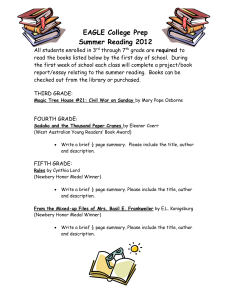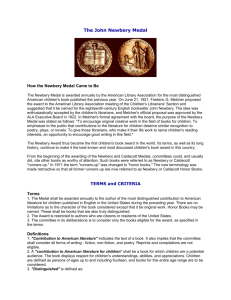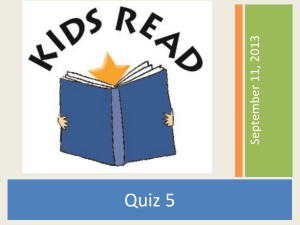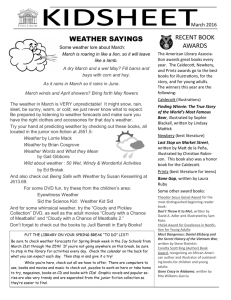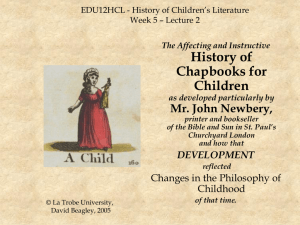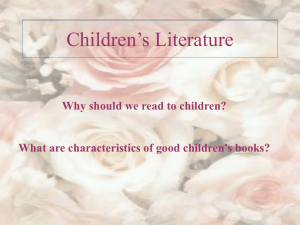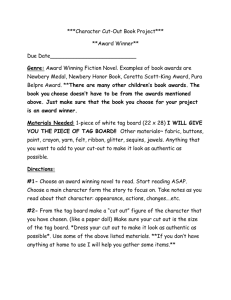Exam I 30 points - School of Information
advertisement
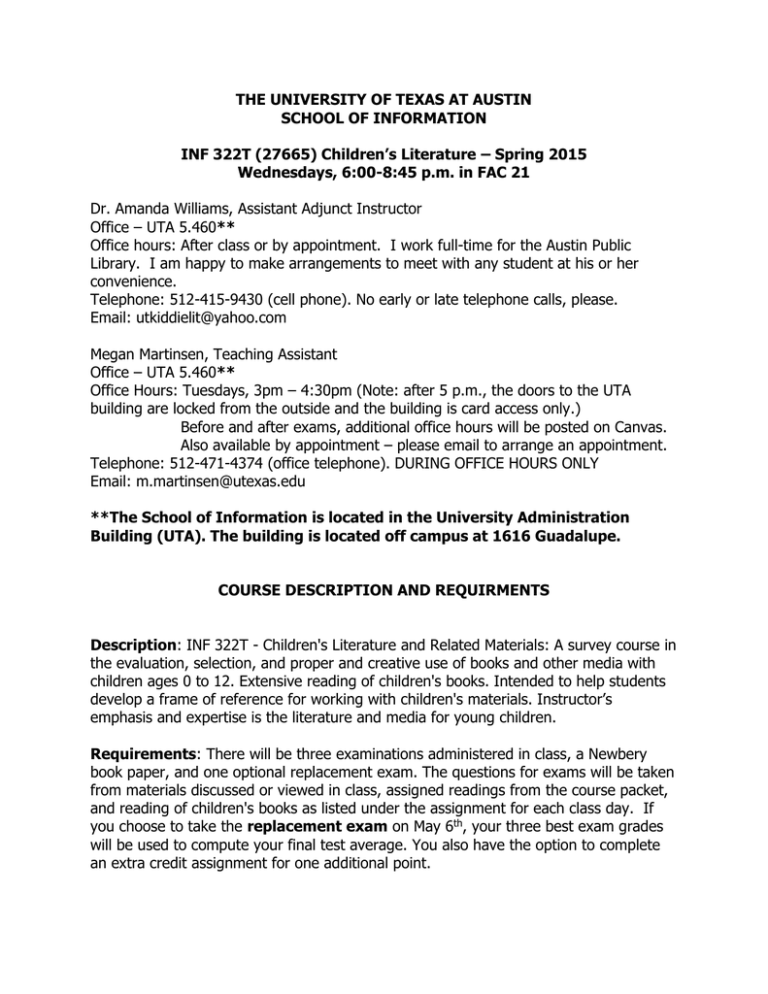
THE UNIVERSITY OF TEXAS AT AUSTIN SCHOOL OF INFORMATION INF 322T (27665) Children’s Literature – Spring 2015 Wednesdays, 6:00-8:45 p.m. in FAC 21 Dr. Amanda Williams, Assistant Adjunct Instructor Office – UTA 5.460** Office hours: After class or by appointment. I work full-time for the Austin Public Library. I am happy to make arrangements to meet with any student at his or her convenience. Telephone: 512-415-9430 (cell phone). No early or late telephone calls, please. Email: utkiddielit@yahoo.com Megan Martinsen, Teaching Assistant Office – UTA 5.460** Office Hours: Tuesdays, 3pm – 4:30pm (Note: after 5 p.m., the doors to the UTA building are locked from the outside and the building is card access only.) Before and after exams, additional office hours will be posted on Canvas. Also available by appointment – please email to arrange an appointment. Telephone: 512-471-4374 (office telephone). DURING OFFICE HOURS ONLY Email: m.martinsen@utexas.edu **The School of Information is located in the University Administration Building (UTA). The building is located off campus at 1616 Guadalupe. COURSE DESCRIPTION AND REQUIRMENTS Description: INF 322T - Children's Literature and Related Materials: A survey course in the evaluation, selection, and proper and creative use of books and other media with children ages 0 to 12. Extensive reading of children's books. Intended to help students develop a frame of reference for working with children's materials. Instructor’s emphasis and expertise is the literature and media for young children. Requirements: There will be three examinations administered in class, a Newbery book paper, and one optional replacement exam. The questions for exams will be taken from materials discussed or viewed in class, assigned readings from the course packet, and reading of children's books as listed under the assignment for each class day. If you choose to take the replacement exam on May 6th, your three best exam grades will be used to compute your final test average. You also have the option to complete an extra credit assignment for one additional point. Exam format: The class will be divided into two sections for each in-class exam, but there will be only one section of the replacement exam. Consult the class calendar for your three exam times. Exam times cannot be changed unless you have a letter from the Office of the Dean of Students. If you take an exam at the wrong time without permission, you will receive no credit for that exam! Exams (90 points): The questions on the three exams and optional replacement exam will be objective—either matching or multiple choice. Exams will consist of thirty questions that are worth one point apiece. Scantrons will be provided. You have two weeks after each exam is graded to see your exam answers during office hours or by appointment. Inquiries about grades must be made within two weeks after the exam date. After two weeks, students cannot view exams. For example, Exam I is on February 18th . Students may come to office hours to review their exams until end of class time on March 4th. Grades are usually posted by the Monday after the exam unless there is a problem. You may request to have your exam brought to class for you to review. Email Megan to arrange for this. Make-up exams are given in emergency situations only. (Remember you have the option to skip an exam and take the replacement exam.) If you have a letter from the Office of the Dean of Students that entitles you to special exam taking options, effort will be made to accommodate your needs. University of Texas rules with regards to academic dishonesty are enforced in this class. Grading: Grades are based on three exams, a paper based on a Newbery Award winning book or Honor Book, and one extra credit option. Students may take the replacement exam and drop one test grade. Exam I Exam II Exam III Newbery Paper 30 30 30 10 points points points points The grading scale for this class will be as follows: A = 90-100 points B = 80-89 points C = 70-79 points D = 60-69 points F = Below 60 points Students taking the class CR/F must earn at least a 60 average to earn a CR. (Graduate students must earn at least a 70 average to earn a CR.) The grade of X (incomplete) will be given only in cases of emergencies that have been reported at the time of the emergency. No plus or minus grades will be given. Canvas: Please refer to Canvas if you need access to the course packet documents and Lecture slides, and grades. Course packet articles and lecture notes are not available through Canvas. A current course packet is on reserve at the PCL. Required Paper: Review of a Newbery Award or Honor book (10 Points). Due March 4th in Class – no electronic papers accepted! Please realize that grading 250+ papers takes a long time. Grades my not be posted until later in the semester. In this paper, you will choose a Newbery Award or Honor book (the runners-up) and analyze why it was chosen as a Newbery book, using the criteria given by the ALSC organization. In your introduction, establish which book you have chosen and give your main reasons for believing it is worthy of the honor. In the body of the paper, you should briefly summarize the book, and then go on to give a detailed analysis and explanation of why it was deserving of the honor of being chosen as a Newbery book, again, making sure you reference the criteria (not the terms or definitions). You might also briefly compare it to other ALSC Newbery books with which you are familiar or that we have discussed in class. This paper should be approximately three pages, double-spaced. You may only review Newbery books that were awarded after 1937 when the award split from being the Caldecott/Newbery Award. In the additional resources section of the course packet, you may want to read the fiction section in “From Cover to Cover: Evaluating and Reviewing Children’s Books” by K T Horning. Students may not review Tale of Despereaux or any other books that are required reading. Grammar, spelling and punctuation will be considered in the grading process. If you need assistance editing, the Undergraduate Writing Center is an excellent resource. Information about the Newbery Award process: TERMS 1. The Medal shall be awarded annually to the author of the most distinguished contribution to American literature for children published by an American publisher in the United States in English during the preceding year. There are no limitations as to the character of the book considered except that it be original work. Honor books may be named. These shall be books that are also truly distinguished. 2. The Award is restricted to authors who are citizens or residents of the United States. 3. The committee in its deliberations is to consider only the books eligible for the award, as specified in the terms. DEFINITIONS 1. “Contribution to American literature” indicates the text of a book. It also implies that the committee shall consider all forms of writing—fiction, non-fiction, and poetry. Reprints, compilations and abridgements are not eligible. 2. A “contribution to American literature for children” shall be a book for which children are an intended potential audience. The book displays respect for children’s understandings, abilities, and appreciations. Children are defined as persons of ages up to and including fourteen, and books for this entire age range are to be considered. 3. “Distinguished” is defined as: • • • • Marked by eminence and distinction; noted for significant achievement. Marked by excellence in quality. Marked by conspicuous excellence or eminence. Individually distinct. 4. “Author” may include co-authors. The author(s) may be awarded the medal posthumously. 5. The term "original work" may have several meanings. For purposes of these awards, it is defined as follows: • "Original work" means that the text was created by this writer and no one else. It may include original retellings of traditional literature, provided the words are the author’s own. • Further, "original work" means that the text is presented here for the first time and has not been previously published elsewhere in this or any other form. Text reprinted or compiled from other sources are not eligible. Abridgements are not eligible. 6. “In English” means that the committee considers only books written and published in English. This requirement DOES NOT limit the use of words or phrases in another language where appropriate in context. 7. “American literature published in the United States” means that books first published in previous years in other countries are not eligible. Books published simultaneously in the U.S. and another country may be eligible. Books published in a U.S. territory, or U.S. commonwealth are eligible. 8. “Published…in the preceding year” means that the book has a publication date in that year, was available for purchase in that year, and has a copyright date no later than that year. A book might have a copyright date prior to the year under consideration but, for various reasons, was not published until the year under consideration. If a book is published prior to its year of copyright as stated in the book, it shall be considered in its year of copyright as stated in the book. The intent of the definition is that every book be eligible for consideration, but that no book be considered in more than one year. 9. “Resident” specifies that the author has established and maintains a residence in the United States, U.S. territory, or U.S. commonwealth as distinct from being a casual or occasional visitor. 10. The term, “only the books eligible for the award,” specifies that the committee is not to consider the entire body of the work by an author or whether the author has previously won the award. The committee’s decision is to be made following deliberation about the books of the specified calendar year. CRITERIA 1. In identifying “distinguished contribution to American literature,” defined as text, in a book for children, a. Committee members need to consider the following: Interpretation of the theme or concept Presentation of information including accuracy, clarity, and organization Development of a plot Delineation of characters Delineation of a setting Appropriateness of style. Note: Because the literary qualities to be considered will vary depending on content, the committee need not expect to find excellence in each of the named elements. The book should, however, have distinguished qualities in all of the elements pertinent to it. b. Committee members must consider excellence of presentation for a child audience. 2. Each book is to be considered as a contribution to American literature. The committee is to make its decision primarily on the text. Other components of a book, such as illustrations, overall design of the book, etc., may be considered when they make the book less effective. 3. The book must be a self-contained entity, not dependent on other media (i.e., sound or film equipment) for its enjoyment. Note: The committee should keep in mind that the award is for literary quality and quality presentation for children. The award is not for didactic content or popularity. Link to Newbery Award Web Site: http://www.ala.org/alsc/awardsgrants/bookmedia/newberymedal/newberymedal Newbery paper is due on March 4th – in class. No electronic papers accepted. Extra credit options: Students may earn up to two extra credit points during the semester. Any student who successfully completes the electronic extra credit assignment mentioned in the course packet will receive one point extra credit (one point added to class average). Extra credit surprise!!! At any time during the semester there could be an extra credit question. At any class lecture you could be asked to answer an extra credit question based on any class lecture or outside reading from a previous lecture. Could be one or more chances but expect at least one extra credit surprise. Each Extra Credit “SURPRISE” is worth one point. Course packet: Available at Speedway Copying located at 715 W 23rd Suite N in the University Tower. Their telephone number is 512-478-3334. Students with disabilities information: The University of Texas at Austin provides upon request appropriate academic accommodations for qualified students with disabilities. For more information, contact the Office of the Dean of Students at 512471-6259 or 512-471-4641 TTY.
